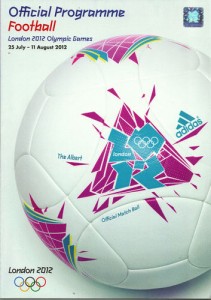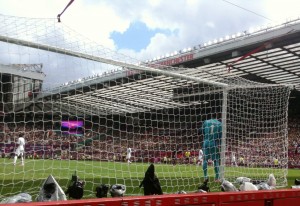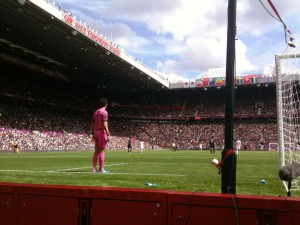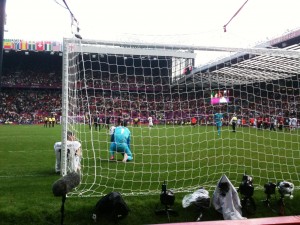2012 London Olympics: Men’s Football Tournament – Quarter Final: Japan v Egypt

When the draw was made and I bought tickets for this match, I was excited at the prospect of watching a game featuring the Under 23 talent of Spain. However, this was blown out of the water as the Spanish were knocked-out of the competition before the last of the Group games, having lost to 1-0 to both Japan and Honduras. Instead the Japanese emerged as winners of Group D, claiming top spot. Up against them in this Quarter-Final were Egypt who finished as runners-up in Group C.
So what of the Blue Samurai and their opponents The Pharaohs?
Japan qualified through the Asian Football Confederations Qualifying tournament along with South Korea and the United Arab Emirates. In the Olympic tournament they were drawn in Group D along with Honduras, Morocco and Spain. In their opening game the Japanese caused an upset in Glasgow when beating much fancied Spain 1-0. Japan had a second 1-0 win over Morocco which clinched a Quarter-Final place before the final game against Honduras which ended 0-0. Twelve of the eighteen squad play their football in Japan, with five in Germany (Hiroki Sakai, Gotoku Sakai, Takashi Usami, Hiroshi Kiyotake and Yuki Otsu), with one in the Netherlands (Maya Yoshida).
Egypt qualified for the Olympic tournament after taking third place in the Confederation of African Football Under 23 competition. At London 2012 they were drawn in Group C along with Belarus, Brazil and New Zealand. In their opening game against Brazil in Cardiff, the Egyptians were struggling badly and after thirty minutes were 3-0 down. However, in a better second-half showing, they got back to 3-2, but couldn’t quite find an equaliser to salvage a draw. Their next fixture was at Old Trafford and Egypt came from behind against New Zealand to draw 1-1. Going into their final game against Belarus in Glasgow, Egypt knew that they had to win to progress and came through 3-1 with all the goals coming in the second-half. Of the eighteen man squad, sixteen play in the Egyptian League with only defender Ahmed Hegazy at Fiorentina and forward Mohamed Salah at FC Basel, playing outside their homeland. One player has had experience of playing in the Premier League, that being Ahmed Fathy who had a very brief spell back in 2007 with Sheffield United.

As with the trip to Newcastle, I’m once again sharing the Olympic experience with my son. The journey this time is the shorter hop across the Pennines to Manchester and it is an early start as the game has a midday kick-off. To date the crowds at Old Trafford have been excellent, but have had the benefit of games featuring, both Great Britain and Brazil. I’m interested to see what the attendance is today given the teams in opposition. As the knock-out phase begins, players and spectators know that there has to be a result today, with those footballing ghouls, extra-time and penalties looming in the background.
The 09:25 train from Leeds is quickly full and we have to stand for the hour it takes to reach Manchester Picadilly. On arrival, there are plenty of Olympic signs and volunteers to provide help in getting the vast crowd to Old Trafford and we are courteously shown where we need to go for the free shuttle bus. We join an enormous snake of people that weaves its way from the station out onto London Road. Despite the volume of people, within fifteen minutes we are on a bus and on our way. Fans in various shirts are on our bus, with the Team GB shirt evident, a number in the blue of Japan, the blue of Chelsea and the differing reds of Egypt, Arsenal and Nottingham Forest. As the bus drops us off near Sir Matt Busby Way, it is evident that there is a big crowd due today as the roads are packed solid with people.

With an hour to kick-off we are at our entrance in the West Stand. As at St James’ Park we are issued with our small clear plastic bag for pocket contents, but are then informed we have to go for a bag search in the car park that will only take “…ten minutes..”. Upon reaching the designated area it is quickly evident that this could take some time. With only one person searching at a table and only eight to ten stations in operation, it is a long and slow task. There were a number of Supervisors around who seemed for no apparent reason to simply wander about and who would have been better employed helping the staff searching and sealing bags to speed up the process. We now realised that what had occurred at Newcastle was (as we suspected at the time), not the correct security procedure. With only five minutes to kick-off we were back at our entrance to the ground with bags searched and sealed with a cable-tie. It was then a body search and removal of the cable-tie before eventually getting in.

The game was already four minutes in by the time we took our seats. They were unusual in that they were the very front row behind the goal and set below pitch level. Being late in there was no time to settle and take in the atmosphere before kick-off and so it was straight down to the action. Japan looked comfortable in possession and were dominating in the early stages. Our position behind the goal meant that the perspective of play at the far end was difficult to judge, so there was a reliance on crowd noise and reaction when there was a incident. On ten minutes Japan had a free-kick wide on the left which was whipped in by Takahiro Ogihara and there was a massive “ooooooooooooooooooooohhhhhhhhhhhhh” from the Old Trafford crowd. Replays showed that Daisuke Suzuki had failed to connect properly with his header when presented with an open goal. Egypt were struggling to get into the game and contributed to their own downfall just four minutes later. Islam Ramadan lost possession to Hiroshi Kiyotake, who played in a brilliant curling ball. Kensuke Nagai was first to it, ahead of Egyptian keeper Ahmed El-Shenawy and defender Saad Samir (who collided), leaving Nagai to slot into the net. However, in doing so the Japanese forward was clattered from behind by Egyptian defender Ahmed Hegazy. The goal-scorer tried to continue but was substituted on twenty minutes with Manabu Saito entering the fray. The next twenty minutes saw Egypt dominate the game and they had efforts at goal from captain Mohamed Aboutrika, Emad Motaeb and Islam Ramadan, all without troubling Japanese keeper Shuichi Gonda. Despite this good spell of pressure The Pharaohs cannot make it pay and on forty minutes, Japan break away with Otsu playing the ball into the centre. Manabu Saito gets ahead of Saad Samir and is heading towards the penalty box. The crowd howls as the forward is brought down and Egypt are down to ten men as Saad Samir is shown the red card. Despite all this Egypt nearly grab an equaliser in the last minute before half-time. Gonda in goal for Japan punches clear from a cross but then attempts to clear the ball as he follows it out of the area. He misses with an attempted kick at the ball, but is fortunate that Mohamed Aboutrika is unable to capitalise on the mistake. Just before the break Shehab El-Din Ahmed is replaced by Mahmoud Alaa El-Din as the Egyptians reshuffle after the sending-off.

At half-time the full-house of 70,772 has time to draw breath. Old Trafford is bathed in glorious sunshine and the ground staff do their bit on the hallowed turf as the substitutes of both sides knock around a few balls in expectation of the second-half. Our ground level view, which whilst not so good in some aspects of viewing action at the far end, has given us a great sight and appreciation of the goal-mouth action at this end. The speed and strength of passing and shots is somehow heightened and more real. It certainly is a different perspective.

It is a slow start to the second-half, with Japan dominating the opening ten minutes possession wise. The Egyptian coach is aware that something has to change and on fifty eight minutes Omar Gaber comes on. However, Japan almost double their advantage, as from a free-kick on the left, Japanese captain Maya Yoshida rises at the back post, but heads over. The game gets scrappy as both sides start to concede free-kicks. With just under twenty minutes to go, Japan shuffle things around as Keigo Higashi comes on for Gotoku Sakai and shortly afterwards, Egypt make their last change with Emad Motaeb coming on for fellow striker Marwan Mohsen. Egypt know that a single goal brings them level and Mohamed El-Nenny has a strike on goal well saved by Gonda. However, Japan break and win a free-kick on seventy seven minutes. Kiyotake from the right swings in a near post free-kick where Maya Yoshida’s flicked header nestles into the corner. The crowd roars its approval and they know The Blue Samurai are on their way to the Semi-Final. With ten minutes left, Japan are looking strong and Manabu Saito is through one on one with the keeper, but the huge “uuuuuuuuuuuuuuuuuuuurrrrrrrrr” from the stands, tells you he put it wide. Egypt’s miserable day is complete when with eight minutes to go, they have to play with nine men as with all their substitutions used, Ahmed Hegazy goes off injured. The final nail in the coffin comes on eighty three minutes, when Yuki Otsu gets between two defenders to send a bullet header in. The final minutes threaten to get out of hand, as Egypt demonstrate their ability to “dish it out” with some overly aggressive and unnecessary fouls, but with three minutes of time added-on up, the referee blows for time. The crowd rise to acknowledge a deserved victory for Japan and their players salute the supporters. For Egypt the feeling is one of despair, as they sink to the ground, heads bowed and no doubt shedding a few tears. Defender Islam Ramadan slumps down by the goal-post and is consoled and eventually dragged off the pitch by reserve keeper Mohamed Bassam. Japan march into the Semi-Final, having yet to concede a goal, the scent of a medal no doubt strong in their nostrils.

Japan 3 (1) – (0) 0 Egypt
Japan: Shuichi Gonda, Yuhei Tokunaga, Hiroki Sakai, Maya Yoshida (c), Daisuke Suzuki, Takahiro Ogihara, Keigo Higashi (Gotoku Sakai [72]), Hotaru Yamaguchi, Hiroshi Kiyotake (Takashi Usami [84]), Yuki Otsu, Kensuke Nagai (Manabu Saito [15]).
Egypt: Ahmed El-Shenawy, Ahmed Hegazy, Ahmed Fathy, Islam Ramadan, Saad Samir, Shehab Ahmed (Mahmoud Alaa El-Din [45]), Hossam Hassan, Mohamed El-Nenny, Mohamed Aboutrika (c), Emad Moteab (Marwan Mohsen [74]), Mohamed Salah (Omar Gaber [58]).
The crowd now make their way out and the journey home begins. Despite the huge numbers of people, the organisation is good and directions are clear for those getting the tram or buses. Very quickly we are on our way back to Piccadilly station. It’s been another good day at the Olympic football.
On the train back to Leeds there is a chance to reflect. Our trips to Newcastle and Manchester have been a once in a lifetime experiences that we have shared. There has been a sense that people wanted to be part of it, no matter that they weren’t in London. Overall the crowd numbers have been incredible. The amount of families taking their children was astonishing and it created a very relaxed but appreciative atmosphere in the stadiums. It wasn’t the usual football crowd, so it will be interesting if crowds across Britain increase in the coming season. I’m left with the feeling that I would have liked to have got to more games. To all the athletes, the fans, the organisers, the volunteers and stewards – thank you. Olympic football showed that it deserves its place in the Olympics. London 2012 – a precious and never to be forgotten experience.